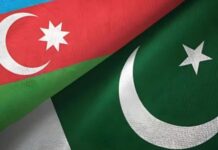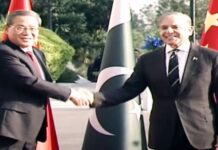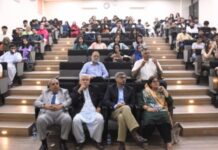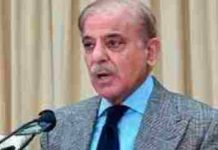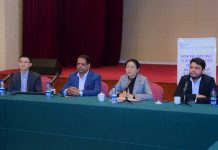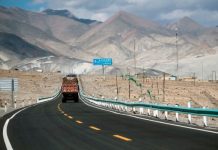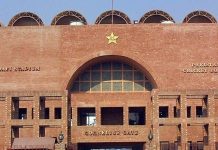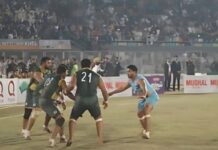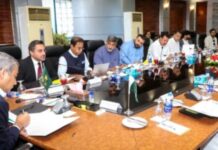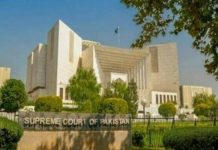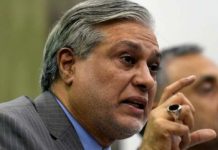ISLAMABAD, (NNI): Asif Ali Zardari, President of Pakistan Peoples Party Parliamentarians (PPPP), on Saturday, received majority votes of the electoral college, comprising the parliament and provincial assemblies, paving way for him to assume the office of President of Pakistan, for the historic second time in country’s parliamentary history.
Voting was held through a secret ballot and polling for the election of the Pakistan’s 14th president concluded in country’s national and provincial assemblies.
The joint coalition candidate Asif Ali Zardari defeated PTI-backed SIC candidate Mahmood Khan Achakzai.
The joint candidate of the ruling coalition, Asif Ali Zardari, secured 255 votes while Pakistan Tehreek-e-Insaf (PTI) backed Sunni Ittehad Council (SIC) candidate Mahmood Khan Achakzai got 100 votes in the National Assembly.
The joint candidate of the ruling coalition, Asif Ali Zardari, secured 246 votes while Pakistan Tehreek-e-Insaf (PTI) backed Sunni Ittehad Council (SIC) candidate Mahmood Khan Achakzai got 100 votes in the Punjab Assembly.
Overall 352 lawmakers cast ballots, while six votes were rejected by the presiding officer.
Zardari clinched 58 votes, while PTI-backed SIC candidate Mahmood Khan Achakzai got three votes in the Sindh Assembly.
PTI-backed SIC candidate Mahmood Khan Achakzai bagged 91 votes in the Khyber Pakhtunkhwa Assembly against his rival PPP’s Asif Ali Zardari. Zardari managed to get only 17 votes in the provincial legislature. As many as 109 KP Assembly members out of a total of 118 cast ballots while one vote was rejected.
Zadari has secured 47 electoral votes from Balochistan Assembly, while PTI-backed SIC candidate Mahmood Khan Achakzai could not secure a single vote in the provincial assembly, according to a result announced by a presiding officer.
Of total 692 lawmakers who cast their votes today, 96 are senators, 336 are members of the National Assembly (MNAs) while 260 are members of the four provincial assemblies.
According to the Second Schedule, the candidate receiving the highest number of votes would be declared the winner by the chief election commissioner (CEC) while the federal government will later notify the result.
Article 41(4) of the constitution says that “election to the office of president shall be held not earlier than sixty days and not later than thirty days before the expiration of the term of the president in office: Provided that, if the election cannot be held within the period aforesaid because the National Assembly is dissolved, it shall be held within thirty days of the general election to the Assembly”.
Since the general elections were held on February 8, the presidential election must be held by March 9, just two days before the retirement of half of the 100-member Senate.
Article 44(1) of the Constitution says that the president will hold office for a term of five years from the day he assumes charge, but he continues to hold the office until a successor is chosen.
All MNAs, senators and MPAs have been asked to bring their computerized national identity cards (CNICs) with them.
In its reply to SIC candidate Mahmood Khan Achakzai’s letter on Friday in which he had requested the Election Commission of Pakistan (ECP) to postpone the presidential election, the ECP had said that the election would be held as per schedule.
Achakzai, in his letter, had argued that since the electoral college was incomplete, therefore the election be postponed.
Zardari served as a member of the National Assembly from 1990 to 1993 and from 1993 to 1996. After Benazir Bhutto’s return to power in 1993, he served as minister of the environment (1993–96) and federal minister for investment (1995–96) in her government.
On January 2008, he was elected as Co-Chairman Pakistan Peoples Party following the assassination of his wife.
Under 18th Amendment, he gave away the presidential powers to strengthen parliamentary democracy and bolstered provincial autonomy, coined political reconciliation, helped policies that encompassed freedom of media, revolutionized telecommunications, revived Pakistan’s energy sector, opened Pakistan to foreign direct investment and strengthen state-owned enterprises.
The PPP government under his leadership got a consensus among all the political parties on the seventh National Finance Commission (NFC) award which increased the provinces’ financial autonomy.
The PPP-led government also unveiled the Aghaz-i-Huqooq-i-Balochistan package aimed at fast track progress and development in the province.
To eradicate crippling polio disease from the country, President Asif Ali Zardari also launched Pakistan’s National Emergency Action Plan 2011.
The historic Benazir Income Support Programme (BISP) was also a Zardari’s brainchild that became the first widely acknowledged social safety net in the region that earned accolades internationally.
In 2013, former Chinese Premier Li Keqiang and former President Asif Ali Zardari agreed to build an economic corridor between the two countries which gave birth to the China-Pakistan Economic Corridor (CPEC).
The historic milestone of Belt and Road Initiative further enhanced the mutual connectivity between the two countries, opened vistas of progress and development and generated unprecedented employment opportunities to Pakistanis.
While he also helped reset the contours of the country’s foreign policy garnering international community’s support on various regional and global issues. NNI






